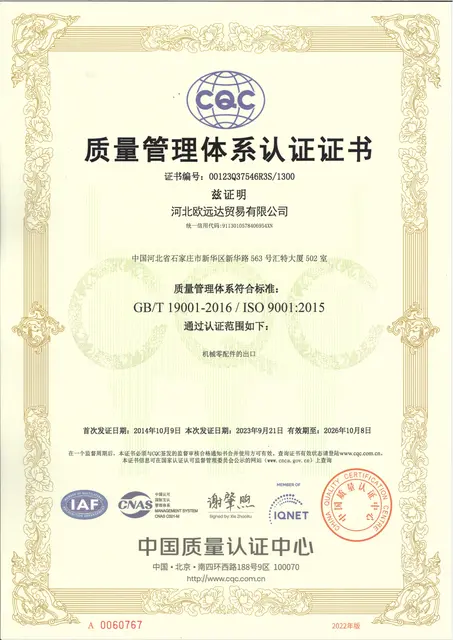Mobile:+86-311-808-126-83
Email:info@ydcastings.com
cracked engine manifold
Understanding Cracked Engine Manifolds Causes, Consequences, and Solutions
The engine manifold is an essential component of an automobile, serving as a pathway for air and exhaust gases. It plays a critical role in the overall performance and efficiency of an engine. However, a cracked engine manifold can lead to significant issues, affecting the vehicle's operation and leading to costly repairs. In this article, we will delve into the causes of cracked engine manifolds, the consequences of such damage, and potential solutions to mitigate the problem.
Causes of Cracked Engine Manifolds
Several factors can contribute to a cracked engine manifold. One of the most common causes is thermal stress. Over time, the manifold is subjected to extreme temperatures, leading to expansions and contractions. These changes can create stress points, eventually resulting in cracks. Additionally, manufacturing defects can predispose a manifold to fail prematurely. Poor quality materials or inadequate welding during production can create weak spots.
Another significant factor is corrosion. Exposure to road salt, moisture, and harsh chemicals can corrode the manifold, weakening its structure. This is especially a concern in regions with harsh winters where salt is used to combat ice on the roads. Over time, the corrosion can lead to compromised integrity and eventually cracking.
Finally, improper installation or misalignment can also cause stress on the manifold, contributing to its likelihood of cracking. If the manifold is not securely fastened or if there is improper spacing with other components, it may not distribute heat and pressure evenly, leading to potential fractures.
Consequences of a Cracked Engine Manifold
cracked engine manifold

A cracked engine manifold can have serious ramifications for vehicle performance. The most immediate consequence is a loss of engine efficiency. A cracked manifold can cause a vacuum leak, which disrupts the air-fuel mixture entering the engine. This can result in a rough idle, decreased acceleration, and overall poor performance.
Moreover, a cracked manifold can lead to exhaust leaks, which not only reduces engine efficiency but can also pose safety risks. Exhaust gases that escape before reaching the catalytic converter can introduce harmful toxins into the cabin of the vehicle, endangering the health of the passengers. Additionally, prolonged exposure to these gases can lead to severe engine damage, necessitating more extensive repairs.
Solutions and Preventive Measures
Addressing a cracked engine manifold requires prompt action to prevent further damage. If you suspect that your manifold is cracked, it’s crucial to have a professional mechanic diagnose the issue. In some cases, small cracks can be repaired using specialized sealants or epoxy, but more extensive damage usually requires a complete replacement of the manifold.
To prevent future cracks, regular maintenance is vital. This includes checking for signs of wear or corrosion, ensuring that the manifold is securely installed, and keeping the engine cool through proper coolant levels and temperature regulation. Additionally, using high-quality fuel can prevent excessive build-up of deposits that may stress the manifold.
In conclusion, a cracked engine manifold is a significant issue that should not be overlooked. Understanding the causes and consequences can help vehicle owners take proactive measures to maintain their engines. Regular inspections, proper maintenance, and early detection are key to ensuring the longevity and reliability of an automobile's engine manifold, ultimately leading to better performance and safety on the road.
-
Impeller Technology That Powers Precision in Pump SystemsNewsMay.22,2025
-
Valve Durability Begins with Quality Cast Iron ComponentsNewsMay.22,2025
-
Performance Cooling with Advanced Automobile Water Pump SolutionsNewsMay.22,2025
-
How Motor Housing and Oil Pans Shape Engine PerformanceNewsMay.22,2025
-
How Metal Castings Drive Modern Manufacturing EfficiencyNewsMay.22,2025
-
Exploring the Engineering Behind Valve Body CastingsNewsMay.22,2025











